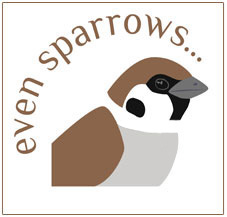

TWO SWALLOWS IN THE BIBLE
Posted: 02.04.24 in Articles category
Two swallows don’t make a summer, but for me their appearance in April signifies that spring has come. Since we moved to Northumberland in the 1990s I have tried to record my first local swallow sighting each year. As I look back now on these records, I typically see my first birds over a two-week period between 6 and 20 April. Most of these records are for single birds, but I once saw 5 together on my first sighting and have an intriguing record from 19 April 1996 when I wrote in my notebook about seeing “a steady trickle of swallows throughout the day”. These may all have referred to single birds, but I cannot recall that degree of detail nearly 30 years later! However, I can recall my earliest local sighting of a swallow – 1 April 2017. It was a dull and slightly misty morning and I was walking along Chare Ends on Holy Island when a single bird flew past me at head height steadily heading north. Despite the timing, I knew I wasn’t being an April Fool and speculated whether this bird would be flying northwards for some distance. I didn’t realise at the time that it was my earliest record for seeing a swallow in Britain. I was also amused by my subsequent observation only minutes later of a flock of Pink-footed Geese also flying north, but presumably departing birds, in their case making their way back to Iceland where they breed.
There are two references to swallows in the Bible. Both are found in the Old Testament in adjoining books, but they differ sharply in terms of content material and sentiment. The first is one of the most popular biblical verses that feature birds. Psalm 84, verse 3, reads as follows:
Even the sparrow has found a home, and the swallow a nest for herself, where she may have her young - a place near your altar.
This psalm delightfully expresses how God's temple is a sanctuary even for small birds whom the psalmist envies on account of their nearness to his altar. It reads as a beautiful prayer of longing by an author who yearns to be in close presence to God like the swallow with her young.
The second swallow reference can be found in Proverbs chapter 26 verse 2:
Like a fluttering sparrow or a darting swallow, an undeserved curse does not come to rest.
It's contained in a proverb that related to cursing - a hostile practice even today in some cultures that can induce considerable fear for those who have been cursed. These wise words from King Solomon imply that innocent people need not fear harm from curses as they won't take effect. They are likened to a swallow in fast flight mode darting here and there, apparently never coming to rest. As I recall, that early swallow I saw wasn’t necessarily darting, but it clearly wasn’t intent to stop flying.